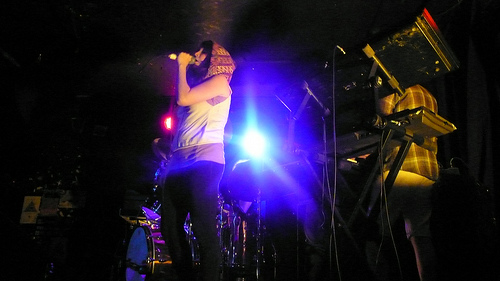Music
Ga’an: Not Just A Requiem For Helm’s Deep

The overload of information provided in the digital age creates a creative climate in which artists often know how they’re going to be perceived before they even make their art. It’s difficult to ever really be completely absorbed in your work when your head is littered with various pretenses, but it’s not impossible to be both aware of what’s up and still feel connected to your heart and limbs. Ga’an proves that music can be fantastic and cerebral without being a secondary experience. In doing so, they have forged forward progress in rock n’ roll, a genre which the cynics continually doom to throwbacks.
Chances are you don’t know Lindsay Powell, and chances are you wouldn’t know even if you were standing right by her. Her lack of presumption causes her to sift through audiences unnoticed like a humble elf on a lantern-lit journey. A half hour later, she casually appears on the very pedestal the audience worships and the element of surprise is enrapturing. Her mystique is evident, composed yet extraterrestrial. It’s clear from the outset that she’s on a different planet, woe is the rest of us. At first you notice her in all black, dressed in a cloak or donning some wiccan pendant around her neck, and you’re tempted to lump it all in as some weird druggy pagan fad, but she doesn’t just wear the part. It’s not just fashion, it’s personal, and the honesty is profound because she revives the sentiment that rock n’ roll is not a concept, but a verb.
Her band Ga’an is nothing less than the musical equivalent of a Viking army. Their Valhalla is a soundscape of minimal keyboards against thunderous drumming and Powell’s empowered war chants. It’s a voyage that often starts with a combination of keyboard and voice that repeats and gradually escalates into a magical oblivion; dawn rises, and the drumming breaks into a jazzy freeform that explores all the rhythmic possibilities available within a very definite structure. They tease you with chaos and then steer into stasis, leaving you breathless in a black hole.
I came across Ga’an frequenting some small DIY shows around Chicago. When I saw them, I thought I was witnessing a string quartet on speed. Every little musical fragment seemed calculated and precise, yet the overall ensemble was a maze of twists and turns that anyone who dared to indulge was teleported into consciousness. I attributed this intricacy to both Lindsay’s vocals–a one-girl choir fueled by a pair of iron lungs that electrify each composition–and to their maniacal drummer, whose primal pounding is star-crossed with jazzy lucidity. Their energy is infectious because it’s immediate and sincere. The intelligence doesn’t overload your senses: they’re not over being into their art, and their steadfast belief in the beauty of what they’re making is seductive. By making themselves attainable, they become even more of an orb to an audience whose recent cultural memory is flooded with meek performers who shelter themselves in costumes and video collages that are designed to make you think the concept is much larger than the artists themselves. Ga’an embody the romantic notion of musical escapism, in which audiences get lost in both the music and the musicians.
Fortunately, Ga’an’s grandness doesn’t leave you wanting or cynical. Their eponymous release in 2009 is one of the darkest records put forth in recent memory. “Chasmeon” starts with a hollow ambience that gradually hypnotizes you and swirls into a heavenly eruption of clattering cymbals and drums. The recording short-circuits into a rolling improv section that ramps up in speed and convulses into paralysis. Before you know it, you wake from a coma and find yourself in another chasm: “Servant Eye.” A track that sucks the light out of rooms with its spaciousness, gradually pulsating from the depths, rising forebodingly, and casting us into the afterlife. From beginning to end, Ga’an revitalizes your faith in the term ‘magnum opus’ and restores the belief that ambition shouldn’t be simply written off as mental masturbation.
In the fall of 2011, they expanded their mythology with Black Equus. A three-song album structured as a three-part epic. The sound is busier and thinner. Whereas the first album felt like a majestic battle against a zero-gravity landscape, the second feels like a muscular death march. Every silence makes you anticipate forthcoming bundles of energy, characterized by electronic sounds singing through the bodies of a chamber choir. On the opening track “Arms they Speak,” Powell’s voice is at once hair-raising and angelic, but always leaves us guessing, tumbling back and forth through magical worlds of good and evil. By the outro, she’s possessed and her repetitive incantations invoke hysteria. On “Call of the Black Equus,” the interplay between the rhythm section and Powell’s synth and voice is layered and mind-bending. It lends an intuitiveness from which the band gains that certain primal quality that makes them as physical as they are cerebral. There’s no sarcasm or tongue-in-cheek parody on this record. If you’re looking for that Spinal Tap moment to emerge from their virtuosity, you’ll most likely be disappointed to find nothing more than real hobbit holes with real wizards and elves.
Rock n’ roll is not dead. Ga’an is proof that in an era of crashing hard drives, mystics are born. They reunite our souls with those bodies rumored to have been lost to us. Ga’an’s magic doesn’t emulate history, it spurns it as a product of its own unique environment, and in doing so this band gives me reason to hope our own rock n’ roll is around the corner. Next time that baby boomer biker dude from the dive across the street tells you that the good days are gone, you slap down a Ga’an record and tell him that the good days are only getting better.